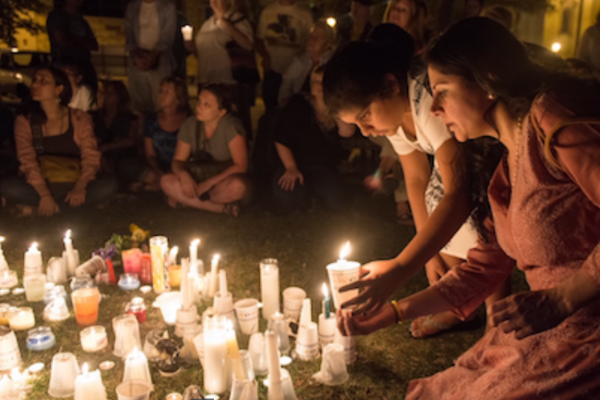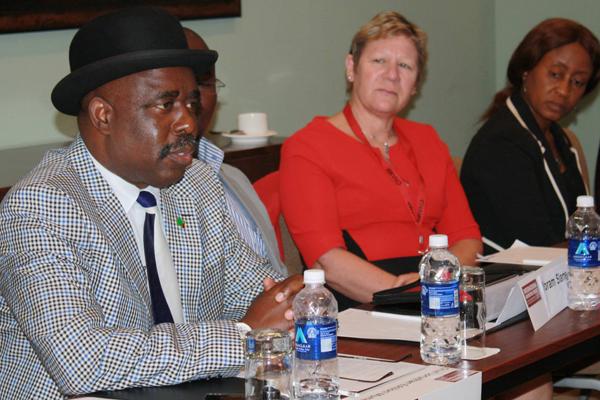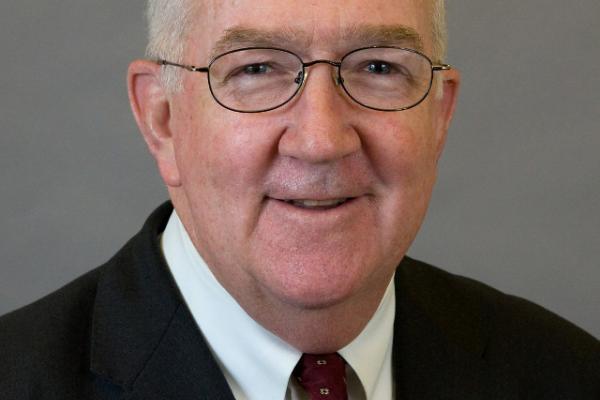Opponents of Obamacare like to talk about how long it takes to get a hip replacement in, say, Canada —even though the Affordable Care Act is nothing like the Canadian health plan. Let's put this in perspective. How about a system that charges so much that some middle-class insured people can't afford a hip replacement at all?
... Unless they fly to a Western European country with "socialized" medicine and pay out-of-pocket?
Check out this story about Michael Shopenn, a man whose artificial hip was manufactured in Warsaw, Indiana, a "global center of joint manufacturing." Shopenn, who had health insurance, could not get coverage for a hip operation because his insurer deemed it a pre-existing condition (note: that should no longer be a problem under the ACA). So he ended up flying to Belgium.
I’m excited to share this mixtape in honor of the Wild Goose Festival, Aug. 8-11 in Hot Springs, N.C.
For the festival proper, this third one will surely be a charm. But for me, it’s the second time around, hence the title of this playlist, also taken from an Indigo Girls song. Getting ready for a music festival for me requires hours upon hours of research: buying and downloading mp3s, studying sounds with the headphones on. These are just a few favorites I’ve found and suggestions for your weekend—mixing up the indie-folk with the psychedelic-liturgical with the pop-folk and power-pop.
The mixtape works like a storybook of sonic massage on the ears, guts, and heart. My prayer is that your listen will provide at least a sliver of the joy that making it offered. Hopefully you can allow this mix to accompany your packing routine or en route roadtrip. See you at the shows! Or if you cannot make it, hopefully these songs will remind you why you wish you could.
It all sounds so… demanding. Sell your possessions and give to the poor. “Be dressed for action." Imagine yourselves as slaves who remain ready for their master’s return — not knowing when it might come.
Luke’s Gospel is big on demanding. In Luke 9:57-62, Jesus encounters three would-be disciples. And each receives a warning that would vanquish enthusiasm like an ice-cold shower.
In some African countries, tribes have shunned circumcision because it was seen as a Muslim practice or was simply considered primitive.
“We thought they were born differently and had to reconfigure the way they were,” said African Chief Jonathan Eshiloni Mumena.
So the tribal chief was not prepared for his son’s declaration that he wanted to get circumcised.
The U.S. Senate has confirmed former Catholic Relief Services head Ken Hackett to be the next ambassador to the Vatican.
Hackett replaces Miguel Diaz, a theologian, and he gives President Obama an experienced voice on social justice in Rome where a new pope, Francis, has made caring for the poor a priority.
Hackett’s confirmation came Thursday night by unanimous consent as senators wrapped up loose ends before the summer recess.
No opposition was expected since Hackett has strong ties to both parties; for five years he served on the board of former President George W. Bush’s Millennium Challenge Corporation and he is reported to be close to Denis McDonough, Obama’s chief of staff, whose brother is a priest.
I live in Texas. To many of its millions of residents, it is the greatest state in the union. We like things big and we like them to be bigger than every other state blessed to be in the Union. Texans are proud of their state; chalk it up to early indoctrination of Texas history throughout the life cycle of Texas Public Education.
But being in Texas, especially East Texas, means that we are sitting squarely and firmly in the buckle of the Bible Belt. The Bible Belt is a term used to describe the area where conservative Christianity is the prominent player in the state’s religiosity; generally this term refers to a high level of conservative, evangelical Christians. This does not mean that you can’t find conservative, evangelical Christians outside of this arbitrary boundary, but for some reason they seem to cluster in these areas in high concentrations.
I didn’t grow up in a church that beat people over the head in church or judged people for they way they acted. I felt loved and welcomed in a place where people were friendly and they loved serving God. I learned about Christ and God’s love for humanity. It wasn’t until I was older that I began to hear more Christians speak more and more on the necessity of evangelizing to people or even being “saved correctly.” I can remember on several occasions a certain church in the town I grew up in going door to door and asking people if they were to die tonight would they go to Heaven. I can remember thinking that it was an odd tactic to get people to come to church. It seemed so stand offish and so self-righteous that it left a bad taste in my mouth.
Days after a cross-country FBI operation arrested 152 sex traffickers across the U.S., Joel Osteen, senior pastor of Lakewood Church in Houston, Texas, announced his support for a bill in the House of Representatives aimed at eliminating human trafficking rings. The Christian Post reports:
The bill, which is supported by both Republican and Democrat lawmakers, is intended to help eliminate human trafficking rings by "targeting the criminals who purchase sexual acts from these organizations and ensuring that they are prosecuted as human traffickers."
"The suffering associated with human trafficking resonates strongly within the Christian community, and we know of many churches, like our own, whose compassion for its victims has moved them to act," said Joel and Victoria Osteen in a statement.
Read more.





